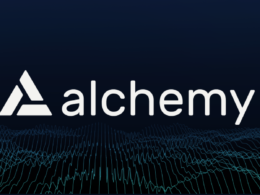There’s one thing anyone willing to approach cryptocurrencies and blockchains seems to know from the outset: ‘Web3 is the future’.
This notion is often repeated in such a dogmatic and casual manner that it’s a very fair assumption to think that it has become more of a marketing catch phrase spouted by ageing executives who feel the need to show they’re ever so in touch with current technological trends.
But where did this start from, and is there any merit to such a confident and difficult prediction?
Decentralisation, The Blockchain Way

We’ve been there before, but it’s always worth a refresh. After all, decentralisation is the key founding principle for all of crypto and the main reason for its rising popularity in an era marked by increasing wealth concentration, ballooning tech conglomerates and mass privacy breaches (be they governmental or private in origin).
It’s a sort of anti-concept, one born out of the need to reduce human fallibility and power concentrations in the wake of the most turbulent financial decade in almost a century. It applied to currency and pure finance at first (through crypto), but quickly expanded to other areas that now all call themselves part of a ‘decentralised web’.
While yet to be perfected, as evidenced by the eternally tricky Bitcoin Trilemma, there is no doubt this concept has proven successful enough to gain both professional and moral backing across a broad spectrum of developers, marketers, economists and, most importantly, customers.
Within the sphere of the crypto and blockchain industries, the concept of ‘decentralisation’ has always meant a few key things.
Firstly, a lack of top-down regulation and legal structure, replaced by community-oriented egalitarian decisional processes, as well as self-regulating reward and punishment mechanisms built around game theory. Secondly, a complete and untarnished transparency across the board: all transactions performed on the wide majority of cryptocurrency chains are public, verifiable and immutable. Lastly, there has been a major focus on concept over functionality: chains need to be preserved and protected in their integrity at any cost – even if that cost is a clunky, costly system that pushes away users as a result of its impracticality.
One thing this first wave of decentralised financial products has failed to achieve is the egalitarian dream of putting a collective fate in the hands of the community: the crypto world is very much dominated by a few big players (Binance and Crypto.com stand particularly tall amongst them) and hostage of shady and incompetent profiteers.
Furthermore, principle alone has never spelled fortune for any revolution. The usability is just not fully there, yet, for that. Hence why Web3 and blockchains are not seen as the now of finance and the internet, but their future.
But some of the biggest names in internet culture (and history) have recently been venting their concerns that we might be looking for the future in the wrong calendar altogether.
Web 3.0 vs Web3

Tim Berners-Lee, the person who will go down in the history books as having invented the ‘World Wide Web’, has grown quite critical of the ‘Web3 future’ buzzword phenomenon we described, and he’s worried people might have misinterpreted his own predictions.
He had previously been talking extensively of the future as ‘Web 3.0’, but he had something in mind which is quite different from what those ‘Ethereum folks’ (sic) have been shouting all along.
Tim is definitely not saying crypto and blockchains have no value, either. He sees a place for them, but that place is much more confined than their enthusiasts think. Echoing many crypto sceptics, he underlined that the technology commonly identified as ‘Web3’ is plainly too slow, too expensive and too public.
He sees the real objective of a decentralised future web as total independence from big conglomerates and their data-hungry servers, as well as control over one’s digital walled garden – rather than a community-controlled all-seeing egalitarian instrument.
He’s evidently quite certain that this is the type of digital future companies would choose, and he’s launched his own project, called Solid, to develop a global ‘single sign-on’ feature (a sort of ‘online passport’) and a very ambitious ‘common universal API’.
His is a battle waged against proprietary technology and centralised data processing, rather than one to overhaul governance and societal power dynamics.
His sentiments have been echoed by both Elon Musk, despite his notorious involvement in ‘memecoins’, and Twitter co-founder Jack Dorsey. The latter was brutal in criticising the lack of true decentralisation in what is today defined as ‘Web3’ – though he placed most of the blame away from users and in the hands of industry executives.
Why Not Both?

The truth, as always, will probably be in the middle.
Berners-Lee’s points are valid criticisms of a groupthink dynamic that has negated more meaningful discussion within the blockchain industry, but they also serve the business goals of his newly launched startup.
There is, for sure, a growing contradiction in the conglomeration of crypto businesses (particularly in the wake of recent bearish action) and the amalgamation of blockchain tech and standard, old-school fintech. But this doesn’t make them any less valuable as technologies. In fact – it proves their point.
A true, dream-like, decentralised web would adopt features from both proposed models: a community-led, leader-less process that can also maintain a component of privacy and control for end-users. A cheap, fast, and scalable solution that remains transparent as needed and out of the control of private institutions.
If Berners-Lee and, say, Vitalik Buterin sat down at a table to agree on an ideal solution, we’re quite confident it would sound like this. And perhaps, to settle the dispute, we should skip a digit and go straight for Web4.
Whatever the outcome or exact nomenclature, it’s undeniable that the internet is entering a new phase: a growth stage enabled by its own growing self-awareness and its now experienced early pioneers reflecting on what went wrong together with tomorrow’s innovators. And we wouldn’t want to miss it for the world.









